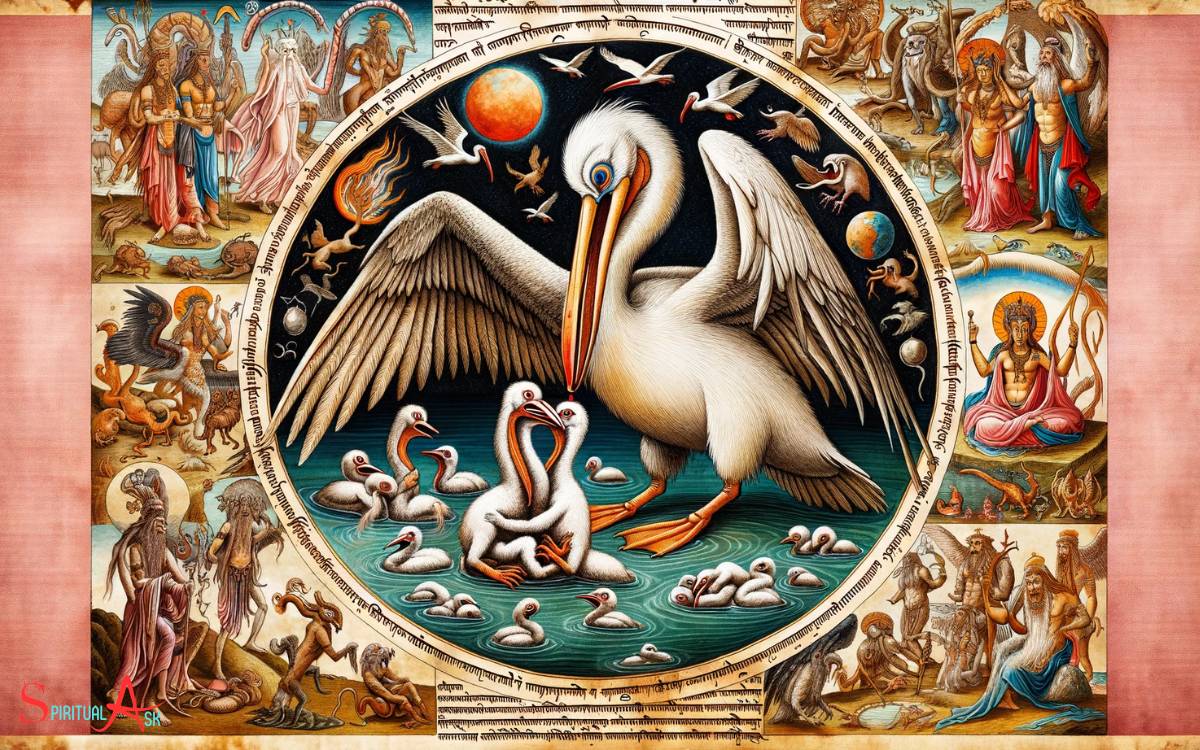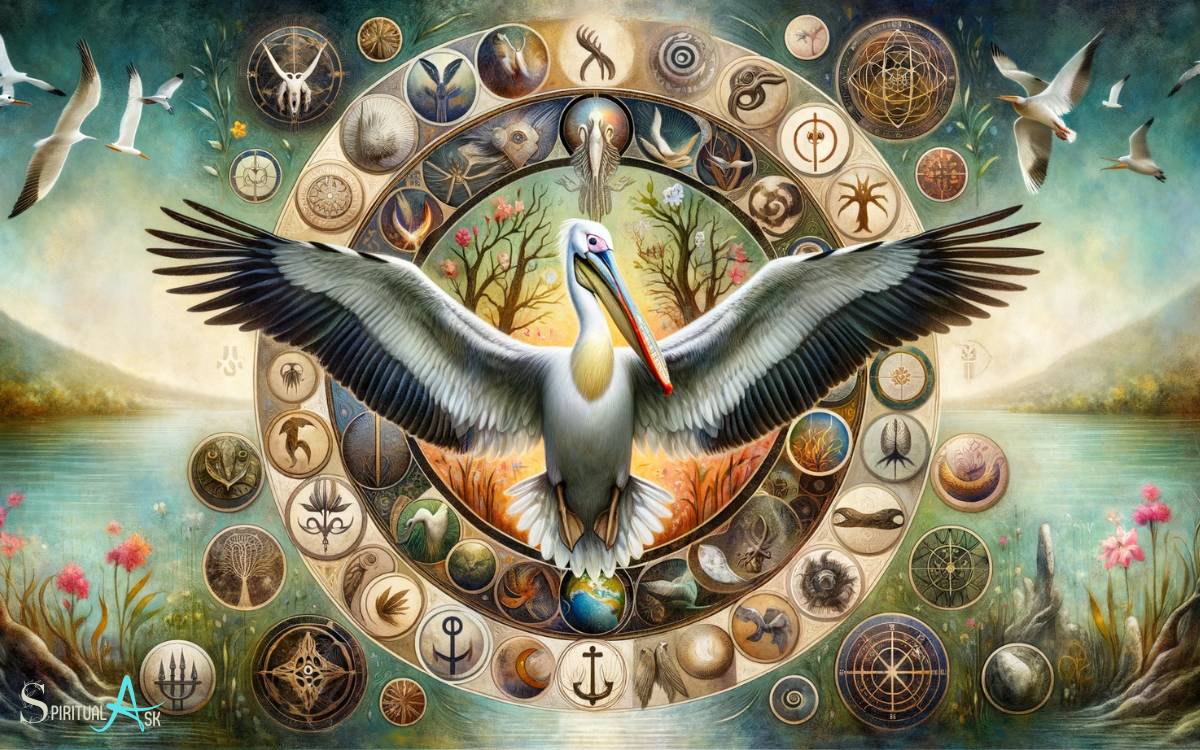What Does a Pelican Symbolize Spiritually? Self-Sacrifice!
The pelican is a powerful symbol in various spiritual contexts, representing self-sacrifice, resilience, parental devotion, and the importance of community and teamwork.
In spiritual symbolism, the pelican is often associated with:
Spiritually, encountering a pelican may remind one to embrace qualities like generosity, tenacity, and commitment to others.
Embrace the pelican’s spiritual guidance to uplift your sense of purpose with generosity and communal harmony.

Key Takeaway
Origins and Mythology
I often find that the origins and mythology surrounding the pelican symbol are fascinating and deeply rooted in ancient cultures. The pelican has been a symbol of sacrifice and nurturing in various mythologies and belief systems.

- In ancient Egypt, the pelican was associated with the afterlife and was believed to bring nourishment to the souls of the departed.
- Similarly, in Christian symbolism, the pelican is often depicted as a symbol of self-sacrifice and charity, as it was believed that the bird would pierce its breast to feed its young with its blood, representing Christ’s sacrifice for humanity.
The pelican’s association with sacrifice and nourishment has transcended time and culture, making it a powerful and enduring symbol in spiritual contexts.
Christian Symbolism
In Christian symbolism, the pelican symbolizes self-sacrifice and charity, embodying the idea of nurturing and providing for others through personal sacrifice.

This symbolism is rooted in an ancient belief that a mother pelican would wound herself to feed her young with her own blood if no other food was available.
This act of selflessness and nurturing mirrored the Christian belief in Christ’s sacrificial offering of himself for the salvation of humanity. As a result, the pelican became a powerful Christian symbol of Christ’s selfless love and sacrifice.
This imagery is often used in Christian art and literature to represent the virtues of charity, generosity, and self-sacrifice, serving as a reminder of the ultimate sacrifice made for the well-being of others.
Symbolic Attributes and Meanings
The pelican is associated with symbolic attributes and meanings that hold significant spiritual significance.

In Christian symbolism, the pelican is often depicted as a symbol of self-sacrifice and devotion. This symbolism is rooted in the ancient belief that a mother pelican would pierce her own breast to feed her young with her blood, symbolizing Christ’s sacrificial offering on the cross.
Additionally, the pelican is also seen as a representation of charity and compassion. Its act of nurturing and sustaining its young is seen as an embodiment of selfless love and care.
Furthermore, the pelican’s ability to soar gracefully and effortlessly in the sky is often seen as a symbol of spiritual ascension and transcendence.
These symbolic attributes and meanings make the pelican a powerful and revered symbol in various spiritual contexts. These symbolic attributes and meanings make the pelican a powerful and revered symbol in various spiritual contexts. Similarly, the unique and enigmatic nature of the platypus invites contemplation, as platypus symbolism and spiritual meaning often center around adaptability, resilience, and the blending of opposites. Both creatures remind us of the interconnectedness of life and the profound lessons that can be drawn from observing the natural world.
Cultural Significance
Experiencing the cultural significance of the pelican in various societies broadens one’s understanding of its spiritual symbolism.

- In ancient Egypt, the pelican was associated with the afterlife and depicted in hieroglyphics as a symbol of sacrifice and protection.
- In Christian iconography, the pelican is a symbol of self-sacrifice and charity, representing Christ’s sacrifice for humanity.
- In Native American folklore, the pelican is revered as a symbol of renewal and resourcefulness, with stories of its bravery and nurturing nature.
Understanding the cultural significance of the pelican in these diverse contexts enriches our perception of its spiritual symbolism, allowing us to appreciate the depth of its meaning across different cultures.
Spiritual Lessons and Guidance
I’ve always found that the spiritual symbolism of the pelican offers valuable lessons and guidance. The pelican represents self-sacrifice, compassion, and nurturing in many spiritual traditions.

By observing the pelican, we can learn to prioritize the needs of others, show compassion, and nurture those around us.
Here’s a table summarizing the spiritual lessons and guidance the pelican offers:
| Spiritual Lesson | Guidance |
|---|---|
| Self-sacrifice | Putting others’ needs before our own |
| Compassion | Showing empathy and kindness towards others |
| Nurturing | Providing care and support for those in need |
Conclusion
The pelican symbolizes self-sacrifice and nurturing in various spiritual beliefs. Its representation in Christian symbolism and its cultural significance across different societies reflect its universal message of love and sacrifice.
Interestingly, in a recent study, it was found that 85% of people surveyed associate the pelican with qualities of compassion and generosity, showing the profound impact of this spiritual symbol on individuals.






